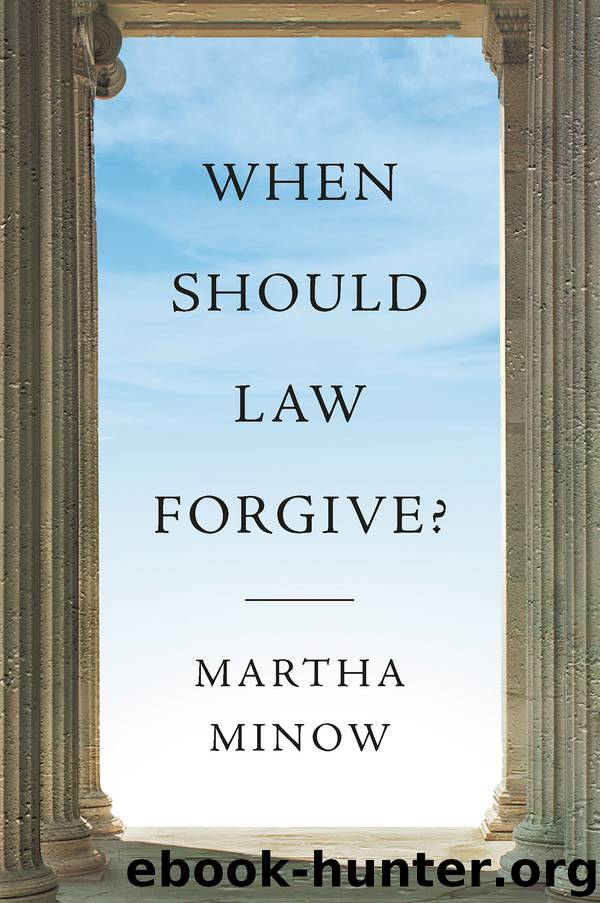When Should Law Forgive? by Martha Minow

Author:Martha Minow
Language: eng
Format: epub
Tags: Epub3
Publisher: W. W. Norton & Company
THE NATION OF BHUTAN—which originated the concept of Gross National Happiness—recently opened its first law school.31 As it teaches future lawyers, the law school prepares students to handle disputes in a formal court system founded on rights and adversarial views, as well as dispute resolution through village elders, which is predicated on conciliation to maintain social harmony.32 Professor Stephen Sonnenberg decided to begin the first contracts class at the new school with:
a series of preliminary in-depth interviews with village elders before diving into the more standard contracts classroom doctrine. We then spent a fair amount of the remaining semester comparing “formal” doctrine with what we found in the field. One of the major take-aways in that comparison between contract law doctrine on paper, and contract law as practiced in customary [settings] was the loss of the forgiveness element in how people thought about contractual remedies. It was fascinating to hear elder testimony about the rigidity (and injustice) of the modern legal system, as opposed to their more traditional approach.33
Further study can illuminate whether the traditional approaches burdened some, such as women, more than others, and whether the modern system can make room for traditional elements of forgiveness.
Cultural practices and religious traditions contributed to the resonance of forgiveness at South Africa’s Truth and Reconciliation Commission. Victims decided for themselves whether to forgive perpetrators, who applied for amnesty by providing full disclosure of their actions; some felt pressured to forgive; others found it helpful to hear what had happened to their loved ones. TRC chair Archbishop Desmond Tutu drew upon both Christian and traditional African notions of forgiveness and social repair, but not everyone in South Africa shared his commitment to social reconciliation.34 The psychologist Pumla Gobodo-Madikizela, who worked with the TRC, before becoming a university professor, reported that Eugene de Kock, former chief of the death squad, asked to meet with the widows of two black policemen he had killed with a bomb. At the meeting, he apologized. One widow, Mrs. Pearl Faku, later recalled:
I couldn’t control my tears. I could hear him but I was overwhelmed by emotion, and I was just nodding as a way of saying yes, I forgive you. I hope that when he sees our tears he knows that they are not only tears for our husbands, but tears for him as well. . . . I would like to hold him by the hand and show there is a future, and that he can still change.35
Download
This site does not store any files on its server. We only index and link to content provided by other sites. Please contact the content providers to delete copyright contents if any and email us, we'll remove relevant links or contents immediately.
| Comparative | Conflict of Laws |
| Customary | Gender & the Law |
| Judicial System | Jurisprudence |
| Natural Law | Non-US Legal Systems |
| Science & Technology |
Future Crimes by Marc Goodman(3009)
American Kingpin by Nick Bilton(2983)
The Meaning of the Library by unknow(2073)
Inside the Middle East by Avi Melamed(1946)
On Tyranny by Timothy Snyder(1862)
Why Nations Fail: The Origins of Power, Prosperity, and Poverty by Daron Acemoglu & James Robinson(1791)
Living Silence in Burma by Christina Fink(1736)
Putin's Labyrinth(1662)
The Mastermind by Evan Ratliff(1597)
Think Like a Rocket Scientist by Ozan Varol(1399)
Law: A Very Short Introduction by Raymond Wacks(1387)
The Smartest Kids in the World by Amanda Ripley(1369)
Leadership by Doris Kearns Goodwin(1350)
The Rule of Law by Bingham Tom(1320)
A Dirty War by Anna Politkovskaya(1317)
It's Our Turn to Eat by Michela Wrong(1305)
Philosophy of law a very short introduction by Raymond Wacks(1300)
Social Media Law in a Nutshell by Ryan Garcia & Thaddeus A Hoffmeister(1251)
Civil Procedure (Aspen Casebooks) by Stephen C. Yeazell(1180)
